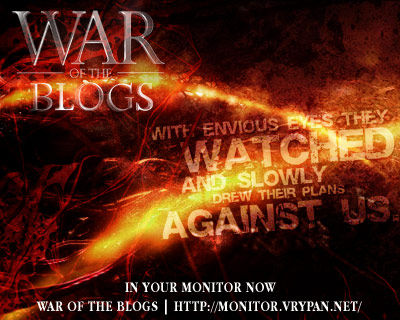
I've been doing some research into the coverage of the Gaza conflict (back end of 2008, front end of 2009) on blogs. One of the English-language blogs that covered the war was the Muqata blog.
The Muqata blog was started in 2005 by ‘Jameel’, a Jewish settler who had lived in Chomesh in Gaza before the Israeli withdrawal.
The blogger says his aim was to promote ‘aliya’ or ascension to Israel by promoting the ‘love of Israel, the land of Israel, and aspiration of living in Israel to the JBlogosphere’. Jameel’s friends assisted with blog postings.
During the Gaza crisis the blog provided dozens of rolling time-stamped updates on the conflict aggregating information from a variety of sources.
There was much discussion at the time about the nature of the media or information war which was running alongside and indeed as part of the Gaza conflict.
The interesting thing about the Muqata blog was that the authors envisaged themselves as combatants in this information war. In a post on 5 January the authors said:
"We’re doing our part, to help with the war on the information front, while the [Israeli Defence Force] IDF does it’s (sic) job in Gaza."
Two days later, the Muqata bloggers suggested IDF radio could not be trusted as a reliable ally in this struggle:
"With news sites around the world taking the Gaza side, with pro-Gaza demonstrations going on everywhere, we need to be as forceful as possible in our media reporting on behalf of Israel.
"Our soldiers in Gaza do not need to be stabbed in the back by IDF radio -- they need our full and total support, and not hearing interviews with the head of the Shifa hospital, which is housing munitions, rockets, and where Hamas terrorists are dressing up as doctors and nurses."
Not only, then, were the Muqata authors taking up the blog as a digital weapon in a media war against a perceived enemy, they were also calling out those they regarded as information traitors from within their own ranks.
General Rupert Smith’s observation that war is now fought amongst the people ‘in every living room in the world’ appears even more prescient given the way individuals are actively deploying digital technologies to participate in media wars.
And if the media, in the broadest sense of the term, is adjudged to have a central role to play then the distinction between civilian and combatant is becoming increasingly blurred.
Photo: Vrypan, Flickr, Creative Commons.

Daniel, I think it's important to always remember that any tool can be used for positive of negative purposes. Of course, what constitutes positive or negative is also a subjective thing, but the main point is that new media can be used as part of a strategy to continue, perpetuate or complement existing conflict just as much as it can be to resolve or transform it.
True, those more interested in contributing to one side of a conflict -- effectively becoming combatants as you say -- generally are the loudest and most visible. However, they also are arguably the less credible and perhaps only reach out to those people who have the same opinions or attitudes, seeking merely to reinforce existing opinions or inflaming those close to the edge anyway.
In the Caucasus this is certainly the case, and especially regarding the conflict between Armenia and Azerbaijan over Nagorno Karabakh. Here to is another interesting aspect, however. That is, it is the media in both countries that is responsible for propaganda and misinformation. In such a situation, therefore, I am not sure blogs and hate groups have much potential as a weapon.
Arguably there is no need as the public is getting most of their information from nationalist and subjectively-skewed articles anyway. In many cases too, the misinformation spread via blogs usually comes from the media too, whether it be pro-government or pro-opposition. Anyway, long and the short of it is that, like everything else, blogs are merely a tool.
They can be used for the purpose of war or for the purpose of peace and it is in the case of the latter that I've been examining the role of new and social media for conflict transformation and resolution on my own Frontline blog. I also touch upon the same issue on Global Voices, the most recent example being here:
Anyway, for now the words of hate and conflict drown out the more tolerant ones, but I do believe part of the 'information war' is and should be also countering propaganda, nationalism and misinformation on blogs as well as in the mainstream media. For now, in the Caucasus at least, blogs are the only medium available.